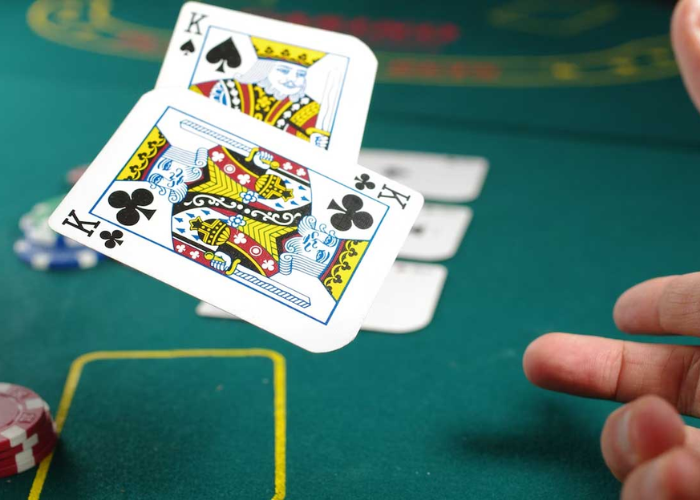Poker is an immensely popular card game combining skill, strategy, and chance. Played using a standard deck of 52 cards and usually two to ten players simultaneously depending on the variety being played, its objective is to win all bets or chips placed by players during play – to reach this endpoint is what poker’s ultimate aim should be!
Poker hands players receive a hand of cards which they use to form the best combination possible from them. Their strength is determined by predefined hand rankings such as pairs, two pairs, three of a kind, straight flushes and royal flushes – though these rankings may slightly change depending on which poker variation is being played.
Key Elements of Poker Games
One of the hallmarks of poker hands is their strategic element. Skilled players utilize mathematical calculations, psychological observations and reading their opponents’ behaviors in order to make informed decisions throughout each round. Bluffing (falsely asserting one has stronger cards than they actually possess) is also an integral component.
There are various variations of poker, each with its own set of rules and gameplay. Some of the more renowned variations include Texas Hold’em, Omaha, Seven-Card Stud and Five-Card Draw – these variations differ in terms of how cards are dealt out, betting structures used and hand rankings employed.
Poker has quickly become one of the world’s most beloved and lucrative global tournaments, both as a recreational activity among friends and a competitive sport with high stakes and prestige events. It has captured players’ imagination due to its combination of strategy, psychology and chance elements.
Strategy and Tips for Success of Poker Games
Mastering the art of poker requires skill, strategy and experience – three components necessary for its mastery for how to play poker games.
- Learn the Rules: Begin your learning of poker by familiarizing yourself with its basic rules. Become familiar with hand rankings, playing order and various betting rounds.
- Learn Your Starting Hands: Understand which starting hands are strong and which are weak so that you can make more informed decisions before and after the flop.
- Engage in Bankroll Management: Create and administer an individual poker bankroll that you can afford to lose, using proper management strategies in order to weather downswings in your play.
- Position is Key: Recognize the significance of position at a poker table. Being in a late position gives you more information on your opponents before making your decision, so play more hands in the late position compared to early.
- Play Tight-Aggressive: One common winning strategy is tight-aggressive play. This involves choosing from among only strong hands when selecting starting hands and betting and raising when appropriate, to increase pressure on opponents and increase your odds of pot wins.
- Monitor Opponents: Pay close attention to how your opponents play and bet, observe any tendencies or tells that could indicate their hand strength, and adjust your strategy to take advantage of any weaknesses they might possess.
- Practice Bluffing Carefully: Bluffing is an integral component of poker, but should only be employed strategically. Look out for situations when it is beneficial – such as having an extremely tight table image or when community cards make it unlikely that opponents hold strong hands – to bluff. Excessive bluffing could result in unnecessary losses.
- Manage Your Emotions: Poker is an engaging combination of skill and luck, so it’s crucial that players remain composed throughout each hand’s play. Avoid falling prey to emotional decision-making by remaining objective while making rational choices based on information available to you.
Tips for playing poker games
- Start Small Stakes Games: For newcomers or those exploring different variations of poker, starting out small stakes games is recommended in order to gain experience and understand its nuances without risking significant amounts of money. This way you can gain valuable knowledge without jeopardizing a financial portfolio in the process.
- Understand Table Dynamics: Pay close attention to how players at your poker table behave – from betting and folding patterns, to how they react in different situations. Observe their interactions for clues on making more informed decisions or exploiting weaknesses in your opponent’s play.
- Tailor Your Strategy Accordingly: Every poker table is different and players’ styles and skill levels vary considerably, so be ready to adapt your strategy as necessary. If tight players appear, reduce starting hand requirements accordingly while aggressive ones should be prepared to make well-timed calls or raises when necessary.
- Understand Pot Odds and Hand Equity Calculations: Make yourself familiar with pot odds and hand equity calculations so you can determine whether continuing in a hand is mathematically profitable, by comparing its potential winnings against any costs of calling bets, so as to make more informed decisions.
- Avoid Going on Tilt: Tilt is an emotional state in which emotional frustration or anger causes poor decision-making. If you experience a tough beat or series of losses, take some time out to relax and regroup before continuing your game – this will allow for clear-headed decisions based on its merit.
- Practice Patience: Poker requires patience to succeed long term. Don’t feel compelled to play every hand or chase after every draw, instead wait for strong starting hands and favorable situations before contributing chips to the pot. Choosing quality starting hands for long term success.
Conclusion
Poker has long held an allure for players around the globe, thanks to its combination of skill, strategy, and chance. Offering an exhilarating and dynamic playing experience for all levels of player.
A poker game’s purpose is to build the strongest hand possible or use betting and bluffing to persuade opponents to fold. Through careful observation, mathematical calculations, and psychological insight players can make informed decisions to gain an edge against their rivals.




